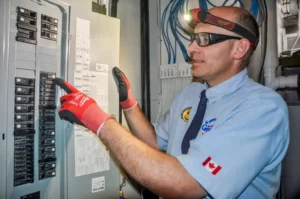
Same Day Service
Since 2001
Call The Gentleman Pros Now!
(587) 797-2979

Before you can sit back and relax, dim the lights, and watch a movie in your new home theatre system, there are some questions you need to ask.
“Was very happy with the outcome of Matthews’s visit today. He was very knowledgeable, and respectful. Will definitely be calling the Gentalmen pros again if needed in the future!” Ashley A

It’s recommended you put your new system in a room with low foot traffic. You don’t want to go to the expense and effort of a new home theatre to be constantly interrupted while trying to watch a movie.
You’ll want a room that’s a little bit out of the way and has enough room for all the parts of your home theatre.
Once you’ve settled on a room take a look at the outlets. Are there enough? Are they in the right spots based on how you want to set up the system? Do you need to add some more outlets? Or move the ones that are there?
This is an important question. Every house and each of its branch circuits has a maximum amount of electricity available and it is called the electrical load.
If you use too many appliances and electrical devices at the same time and they exceed your electrical load, you will flip a breaker or two and electricity will cease to power those devices.
So what does that mean in terms of your home theatre? You are introducing several electrical devices to the branch circuit in your theatre room. If you exceed the electrical load, you won’t have the power to operate your system.
If this is the case, you can add another branch circuit to the room. But this leads to another question. Is there room in your electrical panel for another branch circuit?
Our licensed electricians can answer all your electrical questions. They can tell you:
You could end up paying thousands of dollars for your home theatre, depending on the features you get. So protect it by using a journeyman electrician to install it. They’ll make sure
Our electricians will make recommendations on surge protection. We generally recommend a whole house surge protector to protect a home theatre system but it will depend on your situation.
The earlier you bring your electrician into the conversation, the smoother the installation will go.
So give us a call at (403) 755-4914 and we will book an electrician for you. Or you can fill out our online form or click on the Chat With Us icon at the bottom of the page and we will give you a hand.
They have two hot wires attached to the circuit breaker and one neutral wire attached to the neutral bus bar. Sometimes a 240 V circuit doesn’t require a neutral wire. For example, 240 V baseboard heaters and air conditioners don’t need a neutral wire to complete their circuit.
Double-pole circuit breakers are used on branch circuits that need more electricity than the amount supplied by a single-pole breaker. These circuits provide power to high-energy usage appliances like your dryer or air conditioning unit.
Before you even leave the house to buy your system, do some research. A good setup is more than just a TV, some speakers, and hooking them up. You could do that but you will be disappointed with your viewing experience.
Start with researching home theatre basics and then drill down into various components available, their features, and their costs.
Once you have a good idea of what you want and what the costs are you’re ready to do some planning. Put together two lists, one with your must-haves and the other is your wish list. Then you know what won’t fit into your budget unless you stumble on a great sale. It’s best to know upfront what you can afford.
Keep in mind there will be other costs. Installation, furniture, blackout curtains, lighting, and soundproofing are just some of the potential additional costs when building a home theatre.
While you are planning your home theatre, keep an eye on key developments in the industry. New products can change the home theatre landscape completely.
If a new technology or product you are interested in is going to be released soon, you might want to wait until it is on the market so you can get your hands on it. You’ll be disappointed if you buy your home theatre components right before a pivotal new piece of equipment that revolutionizes home theatres is released.
Once you’ve done a little research and have an understanding of the space you will need, you can think of what room will work best. It may not be the room you thought you’d use.
If you can, pick a room that doesn’t have high foot traffic. You don’t want family members and friends coming and going while you are trying to watch a movie. A room that is a little out of the way, even in the basement would be your best choice. So your living or family room may not be the best choice though it may be your only choice.
A good home theatre needs ample space especially if you use a projector. You want to ensure you can sit far enough back from the screen so you don’t get eye strain and you need space for the surround sound to work optimally.
Know the room’s measurements so you know the optimal size TV for the space and the right speakers for the space. You don’t want a too small or too large of a system for the space.
Think about the outlets and lighting in the room. Does the room have enough outlets and are they in the right spots? Plus how much light is in the room? Sometimes a room with fewer windows is a good option.
Your home theatre is more than just a bunch of electrical devices. Lighting, furniture, and soundproofing can all enhance your theatre’s atmosphere.
You might want to buy some new theatre seating. And you might need to purchase some stands or shelves on which to put the home theatre equipment.
For a great home theatre, you will want to be able to control the light. This might mean blackout curtains for the windows, dimmable lighting, new light fixtures, or a combination.
Soundproofing your home theatre room will block out external noises like traffic, loud neighbours, and other activities in your home. It will also keep the sound of your home theatre in the room, so you don’t become the loud neighbours.
A surge protector will protect the electrical components of your home theatre from electrical surges which can damage and destroy electrical devices. You’ve spent a lot of time and money on setting up your perfect home theatre, it doesn’t make sense to leave it vulnerable to power surges.
Now that you have a good understanding of what you want for your theatre, the changes that need to be made to the room, and the associated costs, you can set your budget. This is where the two lists (the must-haves and the wish list) you made earlier come into play. Based on what you can afford, these lists could change.
Your plan can include:
The more you can plan, the fewer surprises you should have.
Once you’ve set your budget and made your plan, stick with it!



